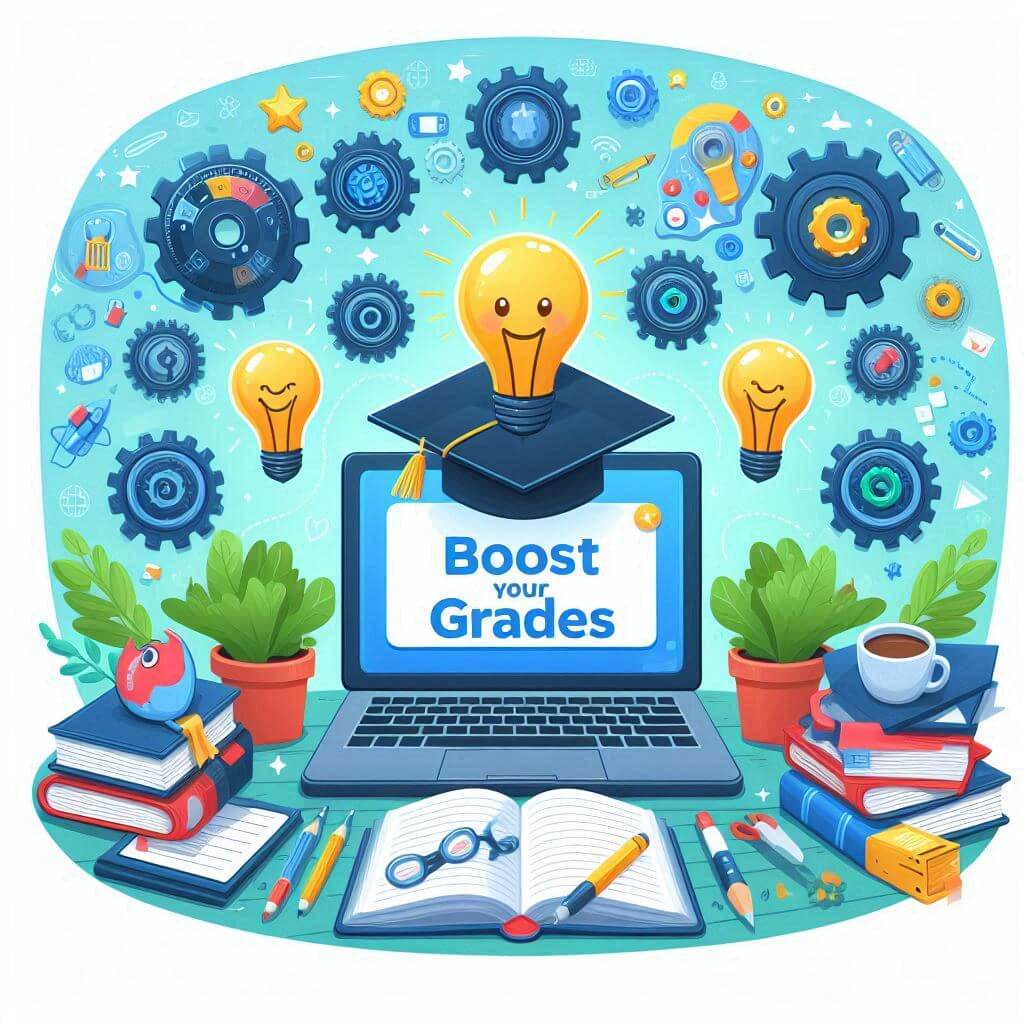Boost Your Grades: Actionable Study Tips for Success
The move from high school to the more challenging college studies is a change that many students can hardly manage. The question on how to study effectively together with a new course load can also be a problem which you have no idea how to solve. The key feature of effective study methods is that they involve different modes of learning. Psychology and Jessie Schwab, a preceptor at the Harvard College Writing Program, in her article, says that we often wrongly estimate the extent to which we have learned. Just because you are able to recite the facts you have learned doesn’t mean you have actually retained the information. Instead of just going over the materials, try to remember the information in an active way, i.e., say it loud or write it down. These methods call for the brain to work more than the one which just passively looks through the text.
Feel free to use the concepts you have learned in new situations and for new examples. This will expand your understanding and will no longer make you feel that you have just memorized the facts. Never attempt to stuff all the knowledge into your head at one time. Divide your studying into smaller portions and work on them more frequently over a period of days or weeks. Talk over the main ideas with a friend or a study group. Being obliged to present and discuss the material with others leads you to understand it better. Write out practice tests or utilize those given to create testing environment. This can help you to get used to the process of recalling the required information which is the case during exams. Make sure that you have a study corner and that it is devoid of disturbances.
Make use of planners, checklists, and other organizing tools in order to get the most out of your study time which should be free from interruptions. The change from high school to college is not an easy one, but by employing efficient active learning techniques, you will be in the best position to understand and retain the material over the long term. Show some patience and take a trial-and-error approach to figure out which methods are most suitable for your learning style.
1. Getting Organized: The Key to Academic Success
Proper organization is a must if you want to achieve your educational goals. Use these excellent study tips to prepare yourself for success:
Diary Discipline
Buy a real diary or planner in which you will very accurately note all the current dates of the assignment submissions. Keeping such a tangible record will definitely help you to be on time with your important tasks.
Class Preparedness
Every day prior to going to a class, check if you have all the necessary materials and devices with you to enable active participation. One very effective way is to pack your bag the night before so that you can leave your place early in the morning without forgetting anything.
By investing time in the implementation of organizational strategies such as constantly updating your diary and preparing for the lesson in advance, you develop academic success habits. If you keep using these methods regularly, you will be in the best position to achieve your educational goals.

2. Talk to Your Teacher & Ask Questions
During college, one must not be shy or hesitant to ask for help from teachers. Such a behavior is highly beneficial for a student. A great opportunity to do so is offered by a workshop-style class, such as the VU Block Model, which has an interactive learning environment.
Using the concentrated manner of study with only one subject at a time, students are free to pose their questions even during the lesson or after it and thus get a swift reaction and further explanation of any parts of the subject matter which are still obscure to them. This direct dialogue with the teachers enables students to have a deeper understanding of the material and to be given, even if only tentatively, the guidance of teachers on assignments before submission.
If so, it will not only result in a better academic performance, but also demonstrate merely through the attitude towards studying, the student’s readiness for the next step which, undoubtedly, will be noticed by the teachers. In general, staff will be quite pleased to see that you are looking for help and, in order to support you, they will provide it willingly.
On top of it, establishing a good connection with professors and utilizing their know-how as well as their free time can completely change the game for academic success. It makes it possible for one to quickly fill in the gaps in their knowledge, keep up with assignments, and maybe even get some advice or insights that are not so easily accessible through other channels.
If teachers are still there as a valuable resource, and if students fully engage with them in the interactive learning environment, thus encouraging them to take the lead in their own education, then the students are likely to establish close ties with their teachers and in the end, improve the level of their education and its results.
3. Space Out Your Studying
One of the best methods to learn isn’t to cram but rather to break up your study sessions over several days. Just by dividing the study load throughout several days, the information retention is more than twice as good, compared to a one-time study session. This spaced way of working can slowly but surely imprint the information so that the student will be able to recall it in a long time. Students who use this technique are likely to perform much better.
Dividing study sessions into different times is based on a psychological principle called the “spacing effect.” This effect indicates that individuals make a more durable memory of the information when the learning is spread over time than when it occurs only once. When the material is reviewed after some time, the brain gets an opportunity to strengthen and stabilize the neural pathways related to that particular knowledge.
In the periods between the spaced learning sessions, the brain is organizing and integrating the new information, and, thus, it becomes more likely to be transferred to long-term memory. Trying to learn a lot of things at once may result in mental overload, tiredness, and low understanding of the matter.
Spaced learning corresponds to the concept of interleaving according to which different ideas or subjects are mixed up in study sessions. The brain gets better understanding and retention through forming links of the related topics and at the same time receiving the new information which prevents it from going into a kind of habit or boredom with the repetitive material.
4. Find A Study Buddy Or Join A Study Group
One of the most effective methods to learn is to do it together with another person. The benefits of having a study buddy are manifold – or even establishing a study group with like-minded students. A study buddy/group comes with a number of benefits. Studies in the company of others provide the necessary drive and support, and therefore one is better able to concentrate and also avoid procrastination.
People who have a schedule for studying with a partner or group are more likely to carry it out and also be accountable for their efforts. A study buddy or a group can be testing and questioning each other on the syllabus which is also a very good way to understand the topics and finding the ones in which they lack further study and even ets. The group members can also read each other’s work, provide useful tips, and more importantly, different points of views, which can help to deepen learning as well as improve assignment quality. The sharing of resources such as textbooks, notes, and other study materials can be a great way to cut down on the costs of an individual student while making sure that everyone is adequately supplied with the necessary materials.
Studying with others is an effective way to create a collaborative learning environment where students can support and learn from one another. Not only does this method lead to a deeper understanding of the subject matter, but it also develops important skills such as teamwork, communication, and critical thinking, which are highly valued in both academic and professional areas.
5. Take Notes
Taking notes will help you keep your mind active during the lesson, and later, you can refine your study techniques while referring to your notes. Writing notes is a good way to bring the information you have just heard live into your long-term memory. These notes will be your key resource for the completion of your assessments and assignments. You may find it useful to briefly write down the major points of your notes after the lesson so that they are organizing and neat.
Emphasize or put a mark in the margin of the most important parts. If there is something that you still do not understand, please get the explanation from your teacher. You can also create diagrams such as flow charts and mind maps to make the material easier. For some students, these visual aids help them remember complex information and study more effectively. In case you are absent from a class, a friend who studies the same subject or a classmate can share their notes with you. This will help you to have the same level of note-taking as others and no gaps in the content.
6. Create A Study Plan – & Stick To It
Creating a schedule or plan is one of the best study tips. It is very helpful for managing your time and can assist you in achieving your learning goals. Making a study plan will encourage you to study, as you will have a time specifically for learning. It will keep you organized with work, hobbies, and other commitments because you can plan ahead.
A study schedule assists in dividing your study load into small parts that you can handle. In addition, it provides you with enough time to finish your assignments, thus making it impossible for you to be rushed or do them at the last minute.
Having a study plan that is well structured is one of the best ways to focus on your academic work and give enough time to each task. When you create a schedule, you can set up a daily routine and develop good study habits which eventually will result in better memory and higher academic achievement.
You can use a study plan to integrate your academic work with other parts of your life such as a job, school activities, and personal commitments. By purposely planning study sessions, you can be sure that you will give the necessary attention to your studies and at the same time not compromise other important parts of a balanced life.
Creating a study plan is like having a guide that leads you through your academic journey and helps you be in line with your learning goals. It creates a feeling of responsibility and stops you from delaying works as you have to stick to the goals and timelines set up.

7. Don’t Just Re-read But Study
9. Test Yourself
The best way to remember something for a long time and to be able to recall it quickly is to practice retrieval, e.g., by quizzing yourself or finding a person to quiz you. Both saying the answers aloud and writing them down help as they are a kind of training to your mind, which integrates the new knowledge.
Use flashcards with questions that help to remember the concepts learned as a method of memorization. The more you involve friends, housemates, or parents in your studying, the more they can help you by quizzing you with the flashcards; at the same time, making the material is a step deeper in memory and thus a great study method.
Plan Ahead—and Stick To It!
Tips For Studying For Students
Here are the key points on effective study strategies from the passage:
- Understand the Study Cycle (previewing, attending class, reviewing, studying, checking understanding) to avoid missing learning opportunities.
- Practice distributed/spaced studying by breaking up study time into shorter daily sessions for each class over several days/weeks instead of cramming. This aids long-term retention.
- Have intense, shorter study sessions of 30-45 minutes using active strategies like self-testing to maintain focus and efficiency.
- Find the noise environment that works best for you – complete silence may not be ideal for active studying.
- In technical courses, prioritize working through practice problems and being able to explain the steps.
- Avoid multitasking during study sessions as it decreases learning quality and efficiency.
- Switch up your study environment regularly to keep your spaces conducive to focus.
- Reading alone is not active studying. Engage with the material through strategies like creating study guides, teaching concepts out loud, making examples/diagrams.
- Organize materials by topic and use active review strategies specific to the course content.
Learn How to Save Money As Student
Short Study Tips
Originally posted 2024-04-28 06:41:29.

